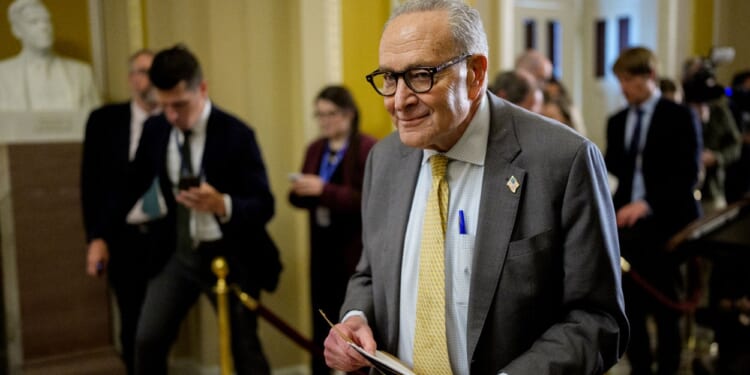On Thursday, the Senate failed to pass bipartisan legislation to fund the Department of War for the next fiscal year, putting military personnel and operations in jeopardy as the government continues to be shut down.
“If anything was needed to demonstrate just how fundamentally uninterested Democrats are in supporting our troops—and defending our country—just take a look at this vote,” Senate Majority Leader John Thune, R-S.D., said on the Senate floor after the vote.
With a final vote of 50 to 44, the measure did not meet the 60 votes needed for passage. Three Democrats voted with Republicans to pass the bill: Sens. Catherine Cortez Masto of Nevada; Jeanne Shaheen of New Hampshire and John Fetterman of Pennsylvania.
Sens. Tim Sheehy, R-Mont., wrote on X, “Dems just voted against funding our military even though this was a bipartisan appropriations bill.”
Sen. Shelley Moore Capito, R-W.V., decried Democrats’ “continued political games.”
Thune had said this week that it was the Democrats’ best interest to back the troops by supporting the GOP legislative measure.
If Democrat senators “want to stop the Defense bill, I don’t think it’s very good optics for them,” Thune explained.
The legislation titled the Department of Defense Appropriations Act, 2026 provided federal dollars for military expenditures like personnel, operations, procurement, as well as research and development. The defense bill did not include expenditures for military family housing, military construction, or civil works projects by the Army Corps of Engineers. Still, the bill would be a crucial step for providing for the military as the current government shutdown threatens federal operations.
Thousands of federal workers deemed nonessential have been furloughed because of the government shutdown, which began on Oct. 1. Essential personnel, whether in the Department of War or elsewhere, still come into their workplaces. Federal employees will receive back pay once the shutdown ends. President Donald Trump has sought to pay military personnel despite the shutdown by redirecting $8 billion of unobligated research development testing and evaluation funds from the prior fiscal year.
Thune also expressed a wish that funding for the Department of Labor, the Department of Health and Human Services and the Department of Education would be voted on as well, essentially bringing back miniature funding legislation.
“We would like to do a package. We’d like to do a mini, like we did before,” the Republican leader stated.
On Thursday, Senate Minority Leader Chuck Schumer, D-N.Y., had responded to speculation about Democrat support for such an effort.
“Right now, the only thing that is on the floor is just the defense bill. Thune needs unanimous consent to add anything else to it. We don’t even know he’ll get that,” the New York senator said.
“It’s always been unacceptable to Democrats to do the defense bill without other bills that have so many things that are important to the American people, in terms of health care, in terms of housing, in terms of safety,” Schumer added.
Schumer then said, “So you all know, they need unanimous consent to add something to the defense bill. They don’t have it.”
George Caldwell contributed to this report.
This is a breaking news article and it may be updated.








